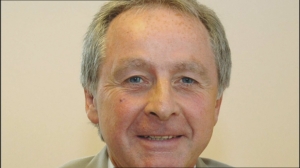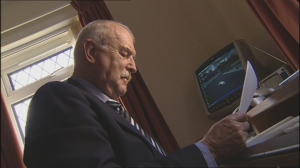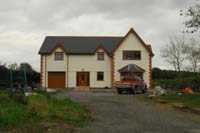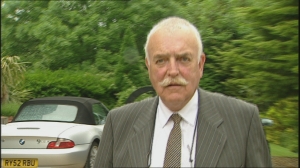 JOHN ARTHUR JONES is one of the most controversial characters ever to have graced local government in Wales.
JOHN ARTHUR JONES is one of the most controversial characters ever to have graced local government in Wales.
Now he’s standing for the council in the May elections on Anglesey.
But he has a problem. Last August the council’s Standards Committee delivered a damning verdict on one of his closest political allies.
Elected as a councillor in 2004, Jones went on to form his own political group, the Radical Independents. For three years the group held the balance of political power on the island.
Jones’ deputy was the retired estate agent David Lewis Roberts.
Last August the council’s Standards Committee delivered a damning indictment on the way David Lewis Roberts handled planning applications.
The committee said his conduct “had been within the generally understood meaning of ‘corrupt’ …” and “gave a clear impression that he had misused his position for personal advantage, and that it amounted to the criminal offence of misconduct in public office.”
The committee’s judgement has never been reported properly — until now …

JOHN ARTHUR JONES
His career in local government has been stormy — he was sacked as Housing Director in 1998 and ten years later lost his seat on the council.
THERE HAVE been two major crises in the political life of Anglesey — and John Arthur Jones has been at the heart of both of them.
Now he is standing again as a councillor in the forthcoming May 2 local elections.
The election was delayed for a year because of the Welsh Government’s dramatic intervention in the affairs of the authority.
His election leaflet doesn’t mention his role in either the crisis of 1996-1998 or the more recent 2005-2008 planning scandal.
He dramatically lost his job as the council’s Housing Director in 1998 after the District Auditor delivered a devastating verdict on the way he ran the department.
Jones personally awarded contracts worth millions of pounds, by-passing the council’s own tendering rules.
The police were called in to investigate the way Jones had built a house on the island. Some of the work was done by men who were receiving housing benefit from the council’s housing department.
Jones was charged with misuse of public office, intimidating witnesses and attempting to pervert the course of justice. He pleaded not guilty – and has always insisted that he was completely innocent.
The trial was stopped after prosecution witnesses admitted discussing the case among themselves.
Jones was elected to the council in 2004 and formed his own political group, the Radical Independents, in 2005.
The four-strong group became the junior members of the coalition that ruled the island for the next three years.
Jones’ deputy was David Lewis Roberts who had already started a campaign to smash the planning rules in the Shepherds Hill area a couple of miles from Benllech.
In a television interview in 2008, Roberts claimed that each member of the Radical Independents was a free agent.

DAVID LEWIS ROBERTS
The retired estate agent from Benllech tried to drive a coach and horses through Anglesey’s planning rules…
“When we formulated the Radical Independents,” he told ITV Wales, “we had an agreement between the four of us – I’m sure the others would tell – that we’d do our own thing. In other words, we didn’t comply with a whip in any form.”
Planning was one of the group’s major areas of interest. David Lewis Roberts was a member of the planning committee, John Arthur Jones was the vice-chairman and a third member, Hefin Wyn Thomas, was the Cabinet member in charge of planning.
♦♦♦
SOON AFTER Roberts was elected, planning applications began to be submitted to build new houses in the quiet country lanes of the Shepherds Hill area of his ward.
Under the existing Local Structure Plan, new houses were not allowed and the normal practice was that planners would refuse the applications using delegated powers.
Councillor Roberts began “calling in” these applications — known as “departures” because they were departures from the council’s structure plan — which meant they would be determined by councillors rather than planners.
Roberts called in at least ten departure applications in his ward. Had all of them been successful, the total value added to the land involved would have been in the region of £1,200,000.
The small community of Shepherds Hill became divided between those who saw a chance to make a financial killing and those who wanted to preserve the character of the area.
Some residents couldn’t resist the lure of a planning permission that would add more than £100,000 to the value of their property.
Their opponents felt that the narrow country lanes — many of them one way tracks with passing places — couldn’t cope with increased traffic. Some also feared that a rash of new houses would reduce the value of their properties.
In May 2006 an application was submitted by a retired policeman for a new property next to the house known as Pant y Bugail.
This land was owned by local landowner and community councillor Dewi Wyn Roberts.
Dewi Wyn Roberts is not related to David Lewis Roberts but the latter “called in” the application to stop it being refused by planners under delegated powers.
As he had done with other applications, Councillor Roberts argued that Shepherds Hill was a “cluster” within the meaning of the Anglesey Local Structure Plan and that the application should be approved.
Planners told him he was wrong, Shepherds Hill was not defined as a “cluster” and recommended refusal.
The owner of Pant y Bugail, Adrian Broad, became concerned about what was happening at Shepherds Hill.
Broad told journalists there were widespread rumours that David Lewis Roberts had bought land in Shepherds Hill from Dewi Wyn Roberts — and was determined to smash the planning restrictions to get planning permission on the land he had bought.
Broad said the rumour was that the land Councillor Roberts had bought was a field of rough grazing land known as The Bonc. The boundary of The Bonc was close to Broad’s home.
Broad decided that he had no alternative but to buy a strip of land from Dewi Wyn Roberts to create a “buffer zone” between his property and The Bonc. It was less than an acre but the “ransom strip” cost him £4,500.
Eventually, in July 2006, the planning application was rejected — with John Arthur Jones voting against it.
But another application, just across the road, was finally approved at the same meeting. Again John Arthur Jones voted against.
This was a paddock next to a house called Bwthyn ar y Bryn owned by an elderly couple, George and June Green.
They spoke to Councillor Roberts who came to see them.
“I said I would do my best for them,” Roberts told ITV Wales two years later “…they said we want to move because the garden is getting too big and I said OK then and that’s what I went on. I got them the planning.”
Another resident, David Armour, claimed that Councillor Roberts came to see him and other residents to try to persuade them that it was council policy to build new houses in Shepherds Hill.
“To my knowledge there must have maybe been ten or twelve objections,” he told reporters, “but as far as he was concerned he was pushing it through and he actually told me on the phone that as far as he’s concerned it would be passed.”
Councillor Roberts spoke up for and voted in favour of the Greens’ application.
When it was finally approved, John Arthur Jones voted against.
The Greens never built anything on the paddock. In October 2006 they sold the site to local businessman Tony Hargreaves for £80,000.
Hargreaves had signed David Lewis Roberts’ nomination papers when he decided to stand as a councillor in 2004.
The Greens later sold their existing bungalow to Hargreaves – and moved to Spain.
Hargreaves later sold the paddock for £125,000.
♦♦♦
BUT BY NOW it was becoming clear that Councillor Roberts was breaking the council’s constitution which does not allow members of the planning committee to lobby for or against applications.
They can do so ‚ but only if they declare an interest and take no further part in the planning committee’s determination of the application.
Planning meetings in the summer of 2006 became heated. After one , a senior council official wrote to committee members to say that ” … if the current trend continues a point will be reached where the committee will lose the confidence of its officers let alone that of the public or even the National Assembly.”
In July John Arthur Jones resigned as vice-chairman of the committee saying that he was fed up with committee members making decisions on personal rather than planning grounds. He remained a committee member.
He stopped short of openly criticising David Lewis Roberts. Roberts resigned from the committee — a move that allowed him to openly support applications at Shepherds Hill.
In December 2006 the council’s external auditors, PricewaterhouseCoopers, produced a report about the large number of departure applications which were coming before the planning committee.
The report noted allegations that David Lewis Roberts was breaking the planning procedure rules and stated:
” … it is imperative that the Council should investigate all alleged breaches of the code of conduct in line with its own procedures.”
The council said it wasn’t its responsibility to investigate.
But opposition to David Lewis Roberts was growing.
The man who acted as the main “whistleblower” was former demolition contractor Barrie Durkin from Benllech who was a member of the community council which covered the Shepherds Hill area.
In 2006 Durkin sent a letter to every councillor. Entitled “Nice Work If You Can Get It”, the letter accused Roberts of “failing to declare an interest and corrupting endless planning applications involving developments worth millions …”
Roberts complained to the Ombudsman saying that Durkin was “outrageous, intolerable and psychotic”.
The Ombudsman, at that time Adam Peat, condemned Durkin:

BARRIE DURKIN
For years the retired demolition contractor was the main “whistleblower” on Anglesey. He became a thorn in the side of the David Lewis Roberts and John Arthur Jones.
“In my view, the language he has chosen to use is more than ‘colourful’, it goes far beyond what could reasonably be regarded as the normal currency of political debate and is clearly libellous.”
He sent the matter to Anglesey’s Standards Committee in 2007 for determination.
The committee “censured” Durkin, ruling that the language he had used against David Lewis Roberts failed to “show respect and consideration” and had brought the office of community councillor into “disrepute”.
In 2008 Durkin was elected to the council. In the same poll, David Lewis Roberts and John Arthur Jones both lost their seats.
In April 2010 David Lewis Roberts made another complaint to the Ombudsman about the language Durkin used against him.
Roberts complained that two weeks earlier Durkin wrote a letter to all councillors in which the whistleblower claimed: “it’s little wonder that the likes of ex, Councillor David Lewis Roberts, was being able to corrupt the Planning Committee on a number of occasions, with complete immunity (which he has now admitted to)”
Roberts also complained that Durkin had also claimed, on the Druid of Anglesey blog, that Roberts had “openly admitted” that he’d told lies, and admitted to everything i’d (sic) accused him of.”
Durkin added:
“Unfortunately because of the ambience of immunity which still exists, David Lewis Roberts is now – through his corrupt activities – sitting on some nine acres of land in one of the most prestiges (sic) area of natural beauty on Anglesey worth with Planning permission without laying a brick some, £10,000,000 or so. Who said crime doesn’t pay?”
The Ombudsman — by now it was Peter Tyndall — was not impressed. He concluded that Durkin “uses phrases (sic) such as ‘corrupt’, ‘lies’ and ‘crime’ when referring to Mr Lewis Roberts. Each of these words gives rise to negative connotations about a person’s character.”
“To suggest that a person is corrupt or the perpetrator of unlawful or criminal acts is a very serious allegation to make and one which I consider should not be made lightly.”
The Ombudsman did concede that it was possible that Roberts had broken the council’s constitution and that he may have failed to declare an interest.
But he chose to concentrate on the words Durkin used that Roberts had “corrupted the planning committee” – and said there was no evidence to support this allegation.
He added “that the manner he employed to express his concerns can only have the effect of lowering the public’s expectations and confidence in their elected members.”
He ended by saying ” … I am satisfied that his actions in commenting on these issues in the way that he did could only have the effect of bringing the authority into disrepute at a time when it is trying to recover from the problems of the past.”
He referred the matter to the Standards Committee which, in August last year, met to consider the matter.
This time around, the committee’s hearing was to be dramatic and its conclusion electrifying.
♦♦♦
THE STANDARDS Committee ignored the nit-picking stance taken by the Ombudsman and got straight down to the core of the issue — was there any substance to Barrie Durkin’s claim that David Lewis Roberts was corrupt?
The Committee rejected an attempt by the council to hear the case in private.
The committee heard from both Durkin and Roberts.
Although Durkin was “not a strong witness as a number of his broad assertions were not supported by evidence”, Roberts was an “unreliable and evasive witness”.
The committee homed in on the relationship between David Lewis Roberts and Dewi Wyn Roberts.
When he gave evidence to the Standards Committee, David Lewis Roberts said he signed a legally binding agreement to buy 9 acres of land called The Bonc at Shepherds Hill on 20 April 2007. The price was £15,000.
The committee then looked at his conduct at the full council meeting on 5 April 2007 where David Lewis Roberts had spoken up in favour of a planning application in Shepherds Hill.
The committee concluded “that, contrary to his evidence, Mr David Lewis Roberts had been in negotiation to acquire the option on the 9 acres at Shepherds Hill for significantly longer than the ‘3 or 4 days’ which he stated, before the completion of the option on 20 April 2007.”
The committee bluntly concluded “… this conduct gave a clear impression he had misused his position for personal advantage, and that it amounted to the criminal offence of misconduct in public office.”
It found that “the substance” of Durkin’s comments “were correct” … “Mr David Lewis Roberts’ conduct in local planning matters in the public office of County Councillor had been within the generally understood meaning of ‘corrupt’ …”
It added that “he had acquired 9 acres of land in a prime location and, if he obtained planning permission for the residential development of that land, it would have very considerable value; and his conduct gave the impression that it amounted to misconduct in public office.”
The Committee also took a dim view of Robert’s activities while he was a member of the council’s Local Development Panel in 2006 and 2007.
The panel was considering where new building would be allowed in the future. Shepherds Hill was discussed as a possible area for new housing but Roberts did not declare an interest.
In January 2008 Shepherd’s Hill resident Peter Day, a friend of David Lewis Roberts who had made several unsuccessful applications to build new houses in the area, submitted a request that the councillor’s 9 acres should be considered for housing development. Day said he was doing so on behalf of David Lewis Roberts.
In December 2011, David Lewis Roberts himself submitted the site for inclusion as housing land in the next Local Development Plan.
Although he had said that his ambition was to build a log cabin for him and his wife, now he was suggesting that 10 houses might be built on the site.
If the council ever give permission to build these 10 properties David Lewis Roberts’ investment of just £15,000 would be worth more than a million pounds.
Inevitably, the Standards committee rejected David Lewis Roberts’ complaint against Barrie Durkin.
♦♦♦
IN FACT, the situation was far worse than the Standards Committee believed because David Lewis Roberts lied when he gave evidence to it— just as he had earlier lied to the Ombudsman.
His claim that he bought The Bonc in April 2007 is false — he actually bought the land six months earlier in September 2006.
Rebecca Television has obtained a copy of an email from his solicitors Edwards & Lane which states: “We confirm the date of exchange of contracts was 13th September 2006.” The email identifies the plot as “Land lying to the north of Pant y Bugail, Tyn y Gongl”.
That plot is The Bonc.
The reason why David Lewis Roberts was desperate to conceal the actual date of purchase was that he had supported a key application on land owned by Dewi Lewis Roberts after he had bought The Bonc.
Early in 2007 he had called in an application to build a house on land at Tan Y Marian, not far away from Shepherds Hill. When it came before the planning committee in March 2007, Roberts supported the development.
The application was finally approved by the planning committee in June 2007. Roberts did not declare an interest.

LAND NEAR TAN Y MARIAN
Planning permission for this house was granted after the man who owned the land secretly sold another plot to Councillor David Lewis Roberts …
John Arthur Jones voted in favour as did another member of Radical Independents, Hefin Thomas.
The permission turned a plot of land that was worth only a few thousand pounds into a site worth £125,000.
But, even though David Lewis Roberts had successfully pulled the wool over the Standards Committee’s eyes over the date he purchased The Bonc, it did him no good.
The Standards Committee verdict was utterly damning.
But the committee then fatally undermined the power of its own verdict by deciding that no further action needed to be taken.
It said that planning procedures had been tightened up and local members could no longer “call in” applications after the council changed the rules in September 2007.
It also noted that the membership of the council had changed.
“Accordingly, the Committee concluded that no action needs to be taken in respect of the matters which were the subject of the hearing.”
The wider message is clear. Get elected to the council and try to corrupt the planning process.
David Lewis Roberts broke the rules — and managed to drive through two planning permissions each worth £125,000.
Even if you’re caught, the council will do little or nothing to stop you …
Last October Rebecca Television wrote to the North Wales Police to ask them to carry out an investigation into David Lewis Roberts’ activities to determine if he has broken the criminal law.
In November Detective Chief Inspector Andrew Williams wrote to say that he was studying the Standards Committee papers.
He promised to “update you further in the early part of next year.” He has not been in touch since.
We asked David Lewis Roberts for a comment. He did not reply to our email.
When the local press reported the Standards Committee verdict it didn’t include its conclusion that Roberts’ conduct “amounted to the criminal offence of misconduct in public office”.
Instead, it reported that Durkin had been cleared.
It quoted David Lewis Roberts “I’m disappointed. I thought the committee was biased in his favour.”
We also asked John Arthur Jones to comment. There was no reply by the time this article was published.
♦♦♦
© Rebecca Television 2013
CORRECTIONS Please let us know if there are any mistakes in this article — they’ll be corrected as soon as possible.
RIGHT OF REPLY If you have been mentioned in this article and disagree with it, please let us have your comments. Provided your response is not defamatory we’ll add it to the article.
DONATIONS If you would like to support the work of Rebecca Television, you can do so by clicking on the DONATE button.
COMING UP
LAST YEAR Winston Roddick, QC was elected the first police commissioner for North Wales. For many years Roddick was a member of one of Wales’ most powerful masonic lodges until he decided to stand down after he took up a judicial appointment. But why didn’t his election campaign make it clear he’d once been a mason? And did the masonic vote in North Wales play any part in his victory?




